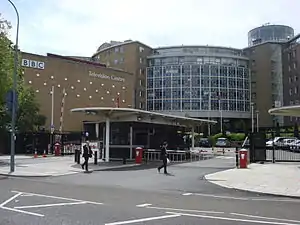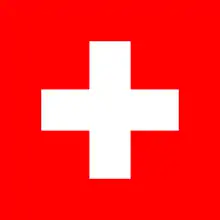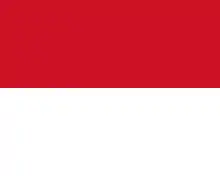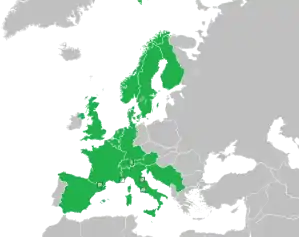Eurovision Song Contest 1963
The Eurovision Song Contest 1963 was the eighth annual Eurovision Song Contest. The contest was held in London, United Kingdom, after the British broadcaster BBC stepped in to organise the event. France had won the 1962 edition with the right to host this following one but were unable to, due to financial shortcomings.
| Eurovision Song Contest 1963 | |
|---|---|
 | |
| Dates | |
| Grand final | 23 March 1963 |
| Host | |
| Venue | BBC Television Centre London, United Kingdom |
| Presenter(s) | Katie Boyle |
| Musical director | Eric Robinson |
| Directed by | Yvonne Littlewood |
| Executive producer | Harry Carlisle |
| Host broadcaster | British Broadcasting Corporation (BBC) |
| Interval act | Ola & Barbro |
| Website | eurovision |
| Participants | |
| Number of entries | 16 |
| Debuting countries | None |
| Returning countries | None |
| Non-returning countries | None |
Participation map
| |
| Vote | |
| Voting system | Twenty-member juries awarded points to their five favourite songs. |
| Nul points | |
| Winning song | "Dansevise" |
The contest was won by Denmark with the song "Dansevise", performed by Grethe & Jørgen Ingmann. Denmark's win was their first, which was the first victory for a Nordic country. Four countries got nul points, with Finland, Norway and Sweden failing to score any points for the first time and the Netherlands for the second time, becoming the first country to go two years in a row without scoring a single point.[1]
Location

The BBC was willing to host the contest instead of the previous year's winner France, as was the case in 1960. They would do so again in 1972 and 1974 because the winning broadcasters from the year before could not afford to produce the contest. The host venue was the BBC Television Centre, White City, London, which opened in 1960. It is one of the most readily recognisable facilities of its type having appeared as the backdrop for many BBC programmes. It remained to be one of the largest such facilities in the world until it redeveloped in March 2013.[2]
Format
Two studios (TC3 and TC4) were used: one for the mistress of ceremonies Katie Boyle, the audience, and the scoreboard; the other for the performers and the orchestra accompanying them. Unusually, a boom microphone (normally used for drama and comedy shows) was employed - the viewer doesn't see this, so it appears as if the artists were miming to their vocals. This was not the case, but this innovation was to create a new look for the contest.[1]
Voting controversy
One controversy this year was during the voting. When it was Norway's turn to announce their votes, the spokesman in Oslo, Roald Øyen, did not use the correct procedure in that the song number, followed by the name of the country, should have been announced before awarding the points. Katie Boyle asked Norway to repeat their results, but the Norwegian spokesman asked Katie to return to them after all the other results were in. When Katie went back to Norway again the votes had mysteriously altered, thus changing the outcome of the contest and giving the victory to Norway's neighbours Denmark at Switzerland's expense. In fact, the Norwegian spokesman had not given the correct votes on the first occasion.[1] Monaco was also asked to do their voting a second time as initially Monaco give one point to both the United Kingdom and Luxembourg. However, when Katie Boyle went back to Monaco to receive the votes again Monaco's one vote to Luxembourg was efficiently discarded (although this did not have any effect on the positions of the countries).[1] It has also been speculated as to whether the juries were indeed on the end of a telephone line or in the actual studio given how clearly their voices could be heard as opposed to sounding as though they were being redirected through a telephone line.
Participating countries
All countries which participated in the 1962 edition also participated in the 1963 edition.
Conductors
The participating conductors were:[3][4]
 United Kingdom – Eric Robinson
United Kingdom – Eric Robinson Netherlands – Eric Robinson
Netherlands – Eric Robinson Germany – Willy Berking
Germany – Willy Berking Austria – Erwin Halletz
Austria – Erwin Halletz Norway – Øivind Bergh
Norway – Øivind Bergh Italy – Gigi Cichellero
Italy – Gigi Cichellero Finland – George de Godzinsky
Finland – George de Godzinsky Denmark – Kai Mortensen
Denmark – Kai Mortensen.svg.png.webp) Yugoslavia – Miljenko Prohaska
Yugoslavia – Miljenko Prohaska Switzerland – Eric Robinson
Switzerland – Eric Robinson France – Franck Pourcel
France – Franck Pourcel.svg.png.webp) Spain – Rafael Ibarbia
Spain – Rafael Ibarbia Sweden – William Lind
Sweden – William Lind.svg.png.webp) Belgium – Francis Bay
Belgium – Francis Bay Monaco – Raymond Lefèvre
Monaco – Raymond Lefèvre Luxembourg – Eric Robinson
Luxembourg – Eric Robinson
Returning artists
This year saw the return of just one artist, with Ronnie Carroll representing the United Kingdom for the second consecutive year.[1]
Norwegian jury votes
If Norway did not make a statement in terms of results, Norway would still have its mark on the vote. Switzerland and Denmark quickly took the lead in the competition, and when Norway voted as number five, problems arose. The Norwegian counter had not managed to figure out the votes of the jury members, and the Norwegian points were therefore not clear. In the confusion, Roald Øyen read a preliminary result and had to ask Katie Boyle to come back later in the vote.
At the end of the vote, Switzerland led two points behind Denmark. When the correct Norwegian points were read, however, Switzerland and Denmark switched places, so that Denmark won the competition two points ahead of Switzerland. The Norwegian jury was later accused of having helped a neighboring country to win, and Switzerland protested against the result. However, NRK rejected the accusations and emphasized that the Norwegian jury had given the right points.
The reason for the chaos was that the Norwegian counter was simply not finished counting the voices when Norway was called up. Not only were the voices wrong, but a stressed eye also read the points incorrectly. When Norway was called back at the end of the vote, the results from the Norwegian jury were clear and correct. "We have good conscience regarding the outcome. The 20 jury members' ballot papers are on the television for control if necessary ”, NRK's Odd Grythe assured.
One of the Norwegian jury members from 1963, Olaf Kjell Wathne Gar, was interviewed by NRK P2 in 2017, and he told about chaotic conditions at NRK Marienlyst during the vote. Gar was a student in 1963, and according to him, Gar and some fellow students were hacked in by NRK in a hurry the same day as the final. They were picked up in taxis and driven to NRK Marienlyst. There they heard the songs twice through loudspeakers in a tiny room. However, the students had decided in advance to vote for Denmark and a few other countries, because they "had the most sympathy for Denmark"
The 20 jury members then voted, and program secretary Einar Johannessen summed up the voices on a chalkboard when London suddenly called. "We were barely half-finished, and at full speed he improvised and scribbled some numbers," Gar said, adding: "It was all so simple and primitive that one would hardly have believed it today". The jury members received NOK 150 each in order to "throw away the Saturday night", which NRK, according to Gar, had called the assignment.
Results
| Draw | Country | Artist | Song | Language[5][6] | Place | Points |
|---|---|---|---|---|---|---|
| 01 | Ronnie Carroll | "Say Wonderful Things" | English | 4 | 28 | |
| 02 | Annie Palmen | "Een speeldoos" | Dutch | 13 | 0 | |
| 03 | Heidi Brühl | "Marcel" | German | 9 | 5 | |
| 04 | Carmela Corren | "Vielleicht geschieht ein Wunder" | German, English | 7 | 16 | |
| 05 | Anita Thallaug | "Solhverv" | Norwegian | 13 | 0 | |
| 06 | Emilio Pericoli | "Uno per tutte" | Italian | 3 | 37 | |
| 07 | Laila Halme | "Muistojeni laulu" | Finnish | 13 | 0 | |
| 08 | Grethe and Jørgen Ingmann | "Dansevise" | Danish | 1 | 42 | |
| 09 | Vice Vukov | "Brodovi" (Бродови) | Serbo-Croatian | 11 | 3 | |
| 10 | Esther Ofarim | "T'en va pas" | French | 2 | 40 | |
| 11 | Alain Barrière | "Elle était si jolie" | French | 5 | 25 | |
| 12 | José Guardiola | "Algo prodigioso" | Spanish | 12 | 2 | |
| 13 | Monica Zetterlund | "En gång i Stockholm" | Swedish | 13 | 0 | |
| 14 | Jacques Raymond | "Waarom?" | Dutch | 10 | 4 | |
| 15 | Françoise Hardy | "L'amour s'en va" | French | 5 | 25 | |
| 16 | Nana Mouskouri | "À force de prier" | French | 8 | 13 |
Scoreboard
Each country had 20 jury members who awarded their five favourite songs 5, 4, 3, 2, and 1 points in order. All those points would then be added up and the five song with the most points got 5, 4, 3, 2, and 1 votes in order. Errors in the Norwegian (see above) and the Monegasque votes meant their scores had to be announced twice, with an adjustment to the scores being made in each case before the final score was verified.
| Voting results | ||||||||||||||||||
|---|---|---|---|---|---|---|---|---|---|---|---|---|---|---|---|---|---|---|
| United Kingdom | 28 | 3 | 5 | 3 | 3 | 3 | 3 | 5 | 2 | 1 | ||||||||
| Netherlands | 0 | |||||||||||||||||
| Germany | 5 | 2 | 3 | |||||||||||||||
| Austria | 16 | 4 | 4 | 1 | 2 | 3 | 2 | |||||||||||
| Norway | 0 | |||||||||||||||||
| Italy | 37 | 2 | 1 | 3 | 2 | 5 | 4 | 5 | 3 | 3 | 5 | 4 | ||||||
| Finland | 0 | |||||||||||||||||
| Denmark | 42 | 3 | 5 | 2 | 3 | 4 | 2 | 5 | 3 | 5 | 5 | 5 | ||||||
| Yugoslavia | 3 | 1 | 2 | |||||||||||||||
| Switzerland | 40 | 5 | 4 | 5 | 1 | 5 | 4 | 4 | 1 | 4 | 4 | 3 | ||||||
| France | 25 | 4 | 1 | 2 | 4 | 5 | 4 | 1 | 1 | 2 | 1 | |||||||
| Spain | 2 | 2 | ||||||||||||||||
| Sweden | 0 | |||||||||||||||||
| Belgium | 4 | 4 | ||||||||||||||||
| Monaco | 25 | 1 | 2 | 5 | 1 | 3 | 1 | 1 | 5 | 4 | 2 | |||||||
| Luxembourg | 13 | 3 | 1 | 1 | 2 | 2 | 4 | |||||||||||
5 points
Below is a summary of all 5 points in the final:
| N. | Recipient nation | Voting nation |
|---|---|---|
| 5 | Denmark | Belgium, Finland, Luxembourg, Netherlands, Sweden |
| 3 | Italy | Denmark, Monaco, Switzerland |
| Switzerland | Austria, Italy, United Kingdom | |
| 2 | United Kingdom | Norway, Spain |
| Monaco | France, Germany | |
| 1 | France | Yugoslavia |
Broadcasters, commentators and spokespersons
Spokespersons
Listed below is the order in which votes were cast during the 1963 contest along with the spokesperson who was responsible for announcing the votes for their respective country.[7]
 United Kingdom – TBC
United Kingdom – TBC Netherlands – Pim Jacobs[8]
Netherlands – Pim Jacobs[8] Germany – Werner Veigel
Germany – Werner Veigel Austria – Emil Kollpacher
Austria – Emil Kollpacher Norway – Roald Øyen[9]
Norway – Roald Øyen[9] Italy – Enzo Tortora
Italy – Enzo Tortora Finland – Poppe Berg[10]
Finland – Poppe Berg[10] Denmark – TBC
Denmark – TBC.svg.png.webp) Yugoslavia – Miloje Orlović
Yugoslavia – Miloje Orlović Switzerland – Alexandre Burger
Switzerland – Alexandre Burger France – Armand Lanoux
France – Armand Lanoux.svg.png.webp) Spain – Julio Rico
Spain – Julio Rico Sweden – Edvard Matz[11]
Sweden – Edvard Matz[11].svg.png.webp) Belgium – Ward Bogaert
Belgium – Ward Bogaert Monaco – TBC
Monaco – TBC Luxembourg – TBC
Luxembourg – TBC
Broadcasters and commentators
Each national broadcaster also sent a commentator to the contest, in order to provide coverage of the contest in their own native language.
| Country | Broadcaster(s) | Commentator(s) | Ref(s) | |
|---|---|---|---|---|
| Participating countries | ||||
| ORF | Hanns Joachim Friedrichs | [4] | ||
| RTB | French: Pierre Delhasse | [4] | ||
| BRT | Dutch: Herman Verelst and Denise Maes | [4] | ||
| Danmarks Radio TV | Ole Mortensen | [4] | ||
| Suomen Televisio | Aarno Walli | [4] | ||
| Yleisradio | Erkki Melakoski | |||
| Première Chaîne RTF | Pierre Tchernia | [4][12] | ||
| Deutsches Fernsehen | Hanns Joachim Friedrichs | [4] | ||
| Programma Nazionale | Renato Tagliani | [4] | ||
| Télé-Luxembourg | Pierre Tchernia | [4] | ||
| Télé Monte Carlo | ||||
| NTS | Willem Duys | [4] | ||
| NRK and NRK P1 | Øivind Johnssen | [4] | ||
| TVE | Federico Gallo | [4] | ||
| Sveriges TV and SR P1 | Jörgen Cederberg | [4][13] | ||
| TV DRS | German: Theodor Haller | [4] | ||
| TSR | French: Georges Hardy | [4] | ||
| TSI | Italian: Renato Tagliani | [4] | ||
| BBC TV | David Jacobs | [4] | ||
| BBC Light Programme | Michael Aspel | |||
| Televizija Beograd | Serbo-Croatian: Ljubomir Vukadinović | |||
| Televizija Zagreb | Serbo-Croatian: Gordana Bonetti | |||
| Televizija Ljubljana | Slovene: Saša Novak | [4] | ||
| Non-participating countries | ||||
| RTP | Federico Gallo | [4][14] | ||
References
- "Eurovision Song Contest 1963". EBU. Retrieved 12 June 2012.
- "Dyke accused of conflict of interest over £6m holding in rival TV firm". The Independent. London. 17 January 2000.
- "And the conductor is..." Retrieved 10 July 2018.
- Roxburgh, Gordon (2012). Songs for Europe: The United Kingdom at the Eurovision Song Contest. Volume One: The 1950s and 1960s. Prestatyn: Telos Publishing. pp. 291–299. ISBN 978-1-84583-065-6.
- "Eurovision Song Contest 1963". The Diggiloo Thrush. Retrieved 4 March 2012.
- "Eurovision Song Contest 1963". 4Lyrics.eu. Retrieved 16 September 2020.
- "Eurovision 1963 - Cast and Crew". IMDb. Retrieved 17 July 2020.
- "Nederlandse televisiecommentatoren bij het Eurovisie Songfestival". Eurovision Artists (in Dutch).
- Dyrseth, Seppo (OGAE Norway)
- "Selostajat ja taustalaulajat läpi vuosien? • Viisukuppila". Viisukuppila.fi. Retrieved 10 August 2012.
- "Infosajten.com". Infosajten.com. Archived from the original on 18 July 2012. Retrieved 10 August 2012.
- Christian Masson. "1963 - Londres". Songcontest.free.fr. Retrieved 10 August 2012.
- Thorsson, Leif (2006). Melodifestivalen genom tiderna ["Melodifestivalen through time"]. Stockholm: Premium Publishing AB. p. 46. ISBN 91-89136-29-2.
- http://casacomum.org/cc/visualizador?pasta=06548.086.18234#!15
